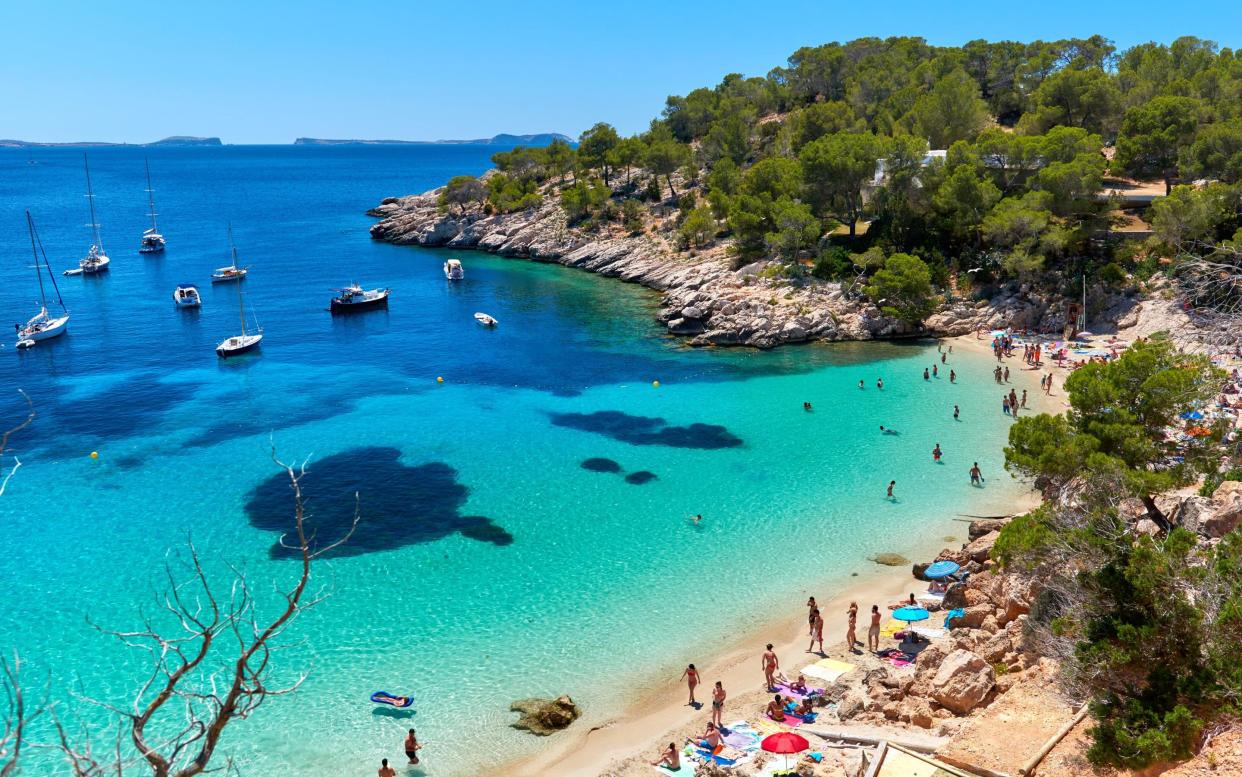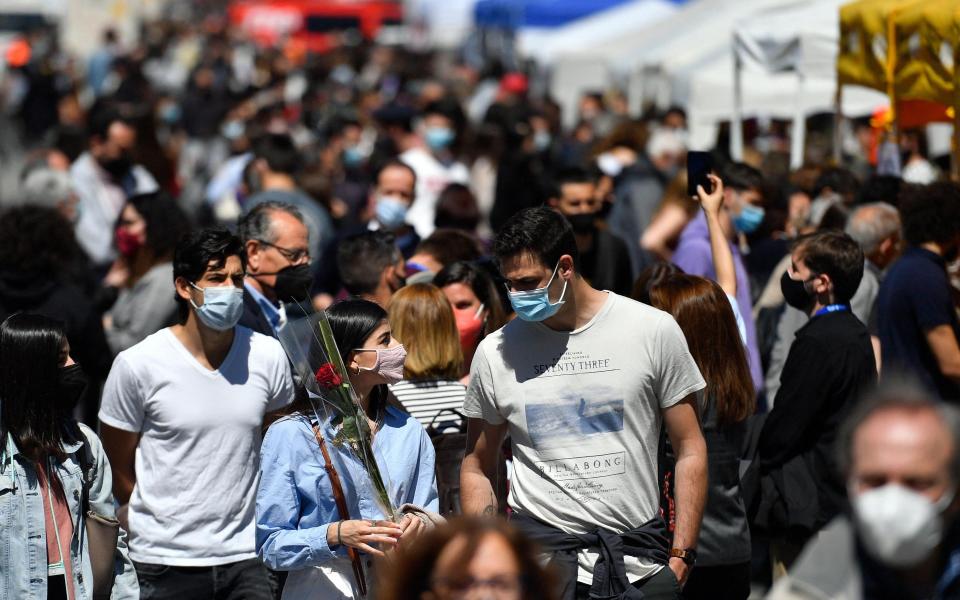Can I travel to Spain? Latest advice as Britons welcome without need for testing

- Oops!Something went wrong.Please try again later.
Spain will allow travellers from Britain into the country without a negative PCR test for Covid-19, from Monday (May 24).
This will mean restriction-free entry, even for unvaccinated Britons; although Spain is on the UK's amber list, meaning travellers have to self-isolate upon their return and carry out several tests.
As suspected, Spain has announced its reopening to Britons ahead of much of the rest of the EU. The EU this week agreed it would allow vaccinated non-EU holidaymakers to visit the bloc this summer, but not until later in June – Spain’s minister of industry, trade and tourism, Maria Reyes Maroto, said on May 11 that she expected the UK to be included in the free-to-travel list.
"International tourists can start planning their Spanish vacations now," tourism minister Reyes Maroto told reporters.
However the UK's own attitude to travellers from Spain – and Britons returning from the country – will mean a series of restrictions remain for holidaymakers. Spain is currently on the 'amber' list, meaning that Britons are able to visit the country, but are also subject to a 10-day quarantine on return.
Under the new 'traffic light' system, those travelling to the UK from amber-listed countries will have to take a pre-departure test, then self-isolate for 10 days on arrival, during which time they will be required to take two PCR tests (on days two and eight of their return). It will be possible to leave quarantine on the fifth day, provided another "test to release" returns negative.
However, transport secretary Grant Shapps has that holidaymakers should not visit amber or red countries, and the Foreign, Commonwealth and Development Office (FCDO) currently advises against non-essential travel to mainland Spain and the Balearic Islands.
Can I visit Spain now?
You can still travel to Spain for essential reasons, but you must self-isolate for 10 days on your return to the UK. Essential reasons include work that cannot be done from home, or emergency medical treatment – not holidays.
In England and Wales, travellers arriving from Spain must self-isolate either at a private address or (if they prefer) in rental/hotel accommodation. Travellers returning from amber-listed destinations will not need to isolate at a government-mandated quarantine hotel: instead, they can isolate at a private address.
When will Spain be added to the green list?
Spain is currently on the amber list. The UK Government has offered no indication of when, or indeed if, the country will be added to the green list. There were hopes that Spain would be included on the next update to the traffic light system, which is expected on June 7, but the Telegraph understands this won't be the case until the following round of changes, due to be announced on June 28.
This pours cold water on Spain's tourism authorities' hopes of the resumption of restriction-free holidays to the destination.
“We know what we have to do to enable British travellers to return to Spain,” said Reyes Maroto: “Continue to lower the accumulated incidence rate of COVID-19 and continue with our vaccination roll-out.” But until any green list announcement is formally made, there is no guarantee that Spain will actually achieve green list status – either before the summer, or later in the year.
What are the current testing rules in Spain?
Currently, UK citizens arriving in Spain must complete a ‘Health Control Form’, confirming that they have undertaken a PCR, TMA or LAMP test within no more than 72 hours prior to arrival, have tested negative for Covid-19, and have evidence (eg a test certificate) to support this.
Spain will not require PCR tests after May 24 – provided that the UK's own seven-day case rate remains low.
What does the ‘amber list’ mean?
Any travellers arriving in the UK from amber countries will be required to self-isolate at home for 10 days (potentially reduced with a paid-for 'test to release' on day five) and to take PCR tests on (or before) day two and on day eight of isolation, as well as taking a test before returning to the UK (they will provide proof of a negative result, which can be a printed document or an email or text shown on your phone) and completing a passenger locator form.
The Government currently requires each of the tests taken in the UK to be a PCR test, which can be costly. Prices are slowly being reduced, with one government-approved provider now charging £45 and Tui offering test packages for "green" destinations from £20.
When will we be able to visit Spain?
Tourism minister Grant Shapps has said that amber-list holidays are "advised against". If you do choose to travel, you must adhere to all of the amber requirements noted above.
With the FCDO currently advising against all but essential travel to Spain (excluding the Canary Islands), your travel insurance will likely be invalidated.
How are case numbers looking in Spain?
Spain has recorded 71.03 cases per 100,000 people over the last 7 days (on May 21), which is high compared to the UK’s current rate of 23.48 cases per 100,000. At present, 39 per cent of the Spanish population have received the first dose of vaccine.
Is Spain in lockdown?
Spain is not in national lockdown, but it is under a 'curfew' – limiting travel to work purposes, education, care reasons or medical treatment. Face coverings are compulsory in indoor spaces, and in some outdoor places (including beaches but not while swimming or sunbathing) too – as well as on public transport nationwide.
Will I need to quarantine on arrival in Spain?
There is currently no requirement for travellers from the UK to self-isolate on their arrival in Spain. Additional rapid tests may be conducted at hotel check-in, or as a follow-up request by border control within 48 hours of arrival. For the full entry requirements, including those for citizens/residents of Spain, see the FCDO's Spain guidance.
When returning to the UK, travellers must take a Covid test within three days of their departure date. In line with UK legislation, passengers will be prohibited from boarding any ferries or flights without proof of a negative result. In addition, all travellers destined for England or Wales must book a travel test package, which includes tests to be taken on days two and eight of isolation.
Will I need a vaccine passport?
Perhaps, but it's unlikely to be compulsory. Quite simply, we do not know yet.
For now, British travellers, including those who are unvaccinated, will be allowed to enter the country without a negative PCR test from May 24.
A 'vaccine passport' could be introduced at a later date though, in line with the EU's decision to allow vaccinated travellers to visit the bloc using a EU-wide certification, which will show proof of vaccination, a negative test or immunity – but discussions are on going.
“Vaccine certification is something we are going towards inevitably,” Gonzalez told RNE radio station. “It will be a very important element to guarantee a safe return to mobility.”
Are flights and ferries still operating?
Yes, airlines are still operating flights between the UK and Spain – though at a far reduced schedule than pre-pandemic – this will likely change as demand surges. Passengers must adhere to all of the border requirements (see 'What are the border restrictions?', above).
The same applies to ferries between the UK and Spain, which continue to run at a reduced capacity. Brittany Ferries' Santander-Portsmouth service is twice-weekly, for example, while its Portsmouth–Bilbao and Plymouth–Santander services are currently suspended.
Do I need to wear a face mask?
Face masks on all forms of public transport, and in crowded spaces, are obligatory for anyone over the age of six, and in some parts of Spain – including Catalonia, the Balearic Islands and parts of the Basque Country – they must be worn in all public settings.

The FCDO says: "The use of face coverings continues to be mandatory for anyone over the age of 6 years old on all forms of public transport in Spain and in many other indoor and outdoor public spaces, even when social distancing of 1.5 metres is observed.
"Specific rules on the use of face masks may vary between regions. You should refer to local authorities for advice. Penalties may be imposed if you do not comply.
"You should carry a face mask with you at all times and be prepared to wear it during your stay."

